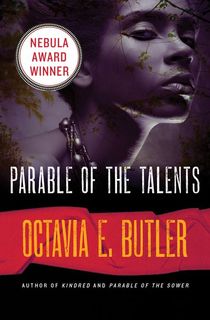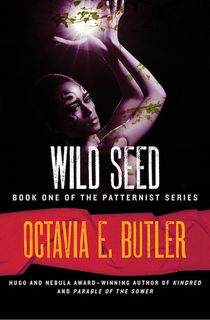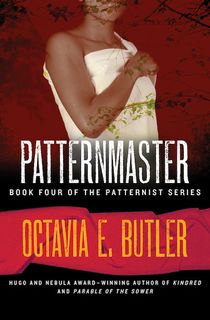Editor's note: Luminescent Threads: Connections to Octavia E. Butler, an anthology celebrating Octavia Butler and edited by Alexandra Pierce and Mimi Mondal, comes out August 15th. We are very pleased to present this essay from Pierce on what the Luminescent Threads team learned about Butler's enduring impact while compiling the anthology.
When you have a new idea for an anthology, it's a bit like being a kid with a new game... one that requires other people's participation to play. You think, what if no one will play with me? What if no one has the time? What if no one else thinks it's a good game?
My first experience of this was with Letters to Tiptree. Alisa Krasnostein and I invited people to play with us and celebrate the centenary of the birth of Alice Sheldon (who wrote as James Tiptree Jr). We asked for and received marvelous letters from such writers as Seanan McGuire, Gwyneth Jones, and Justina Robson. Other people liked it too, it turned out: the book won the Locus and British Fantasy Awards for Non-Fiction; it won the Aurealis Convenors' Award and William Atheling Award for Criticism; it was nominated for the British Science Fiction Society Award, longlisted for the Tiptree Award, and was given an Alfie by George R.R. Martin. After Letters to Tiptree came out, a number of people asked half-jokingly who the next book would be about. A few of them specifically mentioned Octavia Butler. I didn't tell my co-editor and publisher this at the time, but I thought Butler would be an excellent choice for another book of letters... if we were to do another one.
Come 2016, the tenth anniversary of Butler's too-early death arrived; what would have been her 70th birthday was coming up in 2017. Her papers were at the Huntington Library and there were other events being organized. It seemed time, therefore, to float the idea of a book in Butler's honor and see whether anyone wanted to play with us.
We sent emails to authors, editors, critics, artists and academics. We sent emails to literary groups and universities where Butler was on the curriculum. We asked people to share our call for letters and essays as widely as possible. We worked social media and asked our friends to use theirs.
Some people didn't reply; that's ok, we emailed some really busy people, and didn't expect everyone to respond. Some people weren't able to contribute, either because they didn't have the time or because they didn't feel like they had anything useful to say. But some people did want to play. In the end, we chose forty-nine original pieces, including letters to Butler and essays about her life and work. And of course, this isn't a game. It's turned out to be even more serious and passionate and important than we initially imagined.

In her introduction, my co-editor Mimi Mondal (recipient of the Octavia E. Butler Memorial Scholarship to Clarion West in 2015) comments that she "expected to help create a tribute volume, something elegantly detached and intellectual that went well with the muted shades of libraries and halls of fame." Instead what we got were political, personal, poetic and confronting. By their nature, letters invite intimacy, but we didn't expect Alaya Dawn Johnson to reflect on a distressing experience one night in Mexico where she feared rape and how Butler's portrayal of humanity helped her regard those she feared as human; nor Bogi Takács to confess that e-piracy was the only way e was able to access Butler's work in Hungary. Stephanie Burgis and Christopher Caldwell and Hunter Liguore and Karen Lord write movingly of how Butler's words and very life have inspired, and continue to inspire, their own words and lives. And then there's the five pieces written by Octavia E. Butler Memorial Scholarship holders. Kathleen Kayembe writes:
"I've been accepted into Clarion's class of 2016, but can’t be happy about it yet; I’m still waiting to hear whether I’ll get the Octavia E. Butler Memorial Scholarship. Tuition is expensive—I can’t afford it—and my mother is willing to pay my way, but I see how hard she works for how little she gets, and I know it’ll cost her more than money. I slump into my car, tired from working closing shift at a local grocery chain for not much money myself, and check my email.
I've been awarded the scholarship.
I am an Octavia E. Butler Scholar.
Adrenaline and joy wash over me. My name is associated with hers. Nothing can erase this. This connection is mine. To top it off, some of my tuition will be paid. I read the rest of the email, wondering how much I'll still owe, and find out: nothing. It's a full scholarship. I can live this dream without the guilt of borrowing tuition from someone who can't afford it. I feel a sudden weightlessness with the threat of tuition gone. For the first time I am unequivocally happy about going to Clarion. Octavia E. Butler's memorial scholarship has saved me. Once again, she is changing my life."

A page from Octavia E. Butler's notebook, in which she expresses her desire to help young writers attend Clarion West.
Photo Credit: ctavia E. Butler papers. The Huntington Library, Art Collections, and Botanical Gardens.When we put out the call for submissions, the 2016 U.S. elections hadn't occurred; the first due date was early January, 2017. A lot happened in that time in the U.S., and that's reflected in many of the letters. Reflections on President Jarrett, in Butler’s Parable of the Talents — a creation partly based on Ronald Reagan — and his slogan "Make America Great Again." Ben Winters commenting that the world really could have used Butler this year; Hoda Zaki asking admiringly how Butler managed to be prophetic; Jennifer Marie Brissett explaining her anger at the systemic racial injustices still experienced in publishing but how writers of color keep on, and wishing Butler could be there to see it.
RELATED: 10 Octavia Butler Quotes to Live By
As well as letters, we received essays — such essays! Raffaella Baccolini writes of Butler's short story "Bloodchild" in terms of nationalism, reproduction, and hybridity. Gerry Canavan challenges accepted notions of obeying author's wishes by suggesting we disrespect Octavia by republishing Survivor (the book she refused to have reprinted), as well as some of the other material in her papers. And Valjeanne Jeffers writes of what is perhaps my favourite Butler novel, Wild Seed, and the themes of power, family and change present in that astonishing novel.
RELATED: Humanity Is Reborn in Lilith's Brood by Octavia Butler
We named this book Luminescent Threads for the moment in Patternmaster when a character sees the connections between everyone in his community: he sees the luminescent threads binding them all. This book shows those threads that bind disparate people together because of the way that Octavia Butler has influenced their writing, their reading, and their lives. I feel immensely privileged to have seen these threads and to have helped bind them together in this volume.
Alexandra Pierce is senior editor of Luminescent Threads, a collection of essays and letters dedicated to science fiction pioneer Octavia Butler, forthcoming from Australian publisher and champion of under-represented voices in fiction, Twelfth Planet Press. Co-edited by Mimi Mondal, Luminescent Threads is now available for pre-order from the Twelfth Planet Press website, and launches August 15th.




